Bi kdo čip v glavo?
To je posredovano sporocilo. Je sicer v anglescini, a je vseeno grozno za prebirati...kar dolgo je, saj je bil objavljen kot post s komentarji...
torej
LIFE WITH BIG BROTHER
Hospitals tagging babies with electronic chips
Privacy advocates protest as half of Ohio birthing centers
Ask Governor Arnold Schwarzenegger To Follow Through And BAN FORCED RFID TAGGING!
CALIFORNIA PASSES BILL TO BAN FORCED RFID TAGGING
turn to tracking technology
Posted: January 15, 2008
1:00 a.m. Eastern
By Jerome R. Corsi
© 2008 WorldNetDaily.com
Over half the birthing facilities in Ohio are being equipped with an RFID infant protection system placed on infants at birth to prevent them from being abducted from the hospital or from being given to the wrong mother.
"Standard protocol in the hospitals using the VeriChip system is that the baby receives an RFID anklet at birth and the mother receives a matching wristband," VeriChip spokeswoman Allison Tomek told WND. "The mothers are not asked."
VeriChip Corp., a publicly listed company headquartered in Delray Beach, Fla., is marketing though its wholly-owned subsidiary, Xmark, a HUGS brand tag-and-bracelet infant security system. The RFID tag is attached to an infant at birth by an ankle bracelet that is detected by monitors positioned throughout the hospital.
Critics charge the VeriChip system is an intrusive technology solution to a problem that is rare.
"The VeriChip infant security system is a technology looking for a solution," said Katherine Albrecht, founder and director of CASPIAN, Consumers Against Supermarket Privacy Invasion and Numbering.
"Baby snatching from hospital facilities is a diaper full of nonsense," Albrecht told WND.
(Story continues below)
She cited a January 2003 report from the National Center for Missing and Exploited Children concluding that of approximately 4.2 million births per year at 3,500 birthing centers in the U.S., abductions by non-family members are estimated at between zero and 12 per year. Of those, the mother is re-united with the child 95 percent of the time.
"Ironically, relying on RFID technology could end up making a rare occurrence more likely," Albrecht said. "Once hospital staffers rely on computer systems to track the human inventory in their care, they become less vigilant."
Albrecht is co-author along with Liz McIntyre of "Spychips: How Major Corporations and Government Plan to Track Your Every Purchase and Watch Your Every Move."
The HUGS system can detect if the RFID tag is lifted from the baby's skin, if the ankle strap broken or if the baby's RFID tag and the mother's don't match.
If a newborn is removed from the ward without authorization or a baby is placed with the wrong mother, the system triggers an alarm that can cause hospital entrances and exits to lock shut.
"The infant abductions that do occur tend to happen in larger, more impersonal hospitals," Albrecht emphasized.
"We actually investigated an abduction that involved a baby who was wearing an RFID ankle bracelet at the time of the abduction," Albrecht said. "What happened was a woman dressed up in hospital scrubs. Even though the other staffers in the maternity ward did not recognize this woman, nobody reported her, because they thought the RFID system would take care of any problem."
The woman figured out how to turn the RFID system off, Albrecht said, 'and she just walked right out of the hospital carrying the baby, without anybody stopping her."
VeriChip objects, claiming its RFID anklet-and-bracelet infant security system has prevented baby abductions. Spokeswoman Tomek, however, declined to cite specific proof, claiming privacy issues and the need to keep hospital security procedures confidential.
The VeriChip RFID anklets and bracelets are removed by the birthing facility when the mothers and babies are released.
HUGS system RFID anklets and bracelets are not equipped with GPS technology.
VeriChip also produces a human implantable RFID chip that is marketed in the health care area for chronic diseases, including diabetes or stroke, or memory impairment illnesses such as Alzheimer's disease.
"The only viable part of the VeriChip market right now is this infant security system," Albrecht told WND. "People in the United States don't want the human implantable RFID chips VeriChip thought was going to be the core of their business."
Albrecht said VeriChip hopes eventually there will be a mandatory program such as the UK has for implanting RFID chips in prisoners."
The VeriChip human implantable RFID chip was cleared for medical use in the U.S. by the Food and Drug Administration in October 2004.
VeriChip currently has a market capitalization of about $20 million and 2006 sales of more than $27 million.
VeriChip stock closed yesterday at $2.02 a share.
----------------- Bulletin Message -----------------
From: Eddie
Date: Jan 13, 2008 4:31 PM
The age of RFID chip implant is here! This is not just in the US, it is happening all around the world! The globalist bankers' plan is to chip the ENTIRE GLOBAL POPULATION!
All major mainstream media are hyping up the VeriChips! You can see from all of these video clips!!
EVERYONE send letters to your governors and law makers, urge them to hurry up and race the clock and block this evil enslavement scheme amidst a financial chaos! A cashless society is within sight!
For those who live in California... read the following links and tell your congressman and congresswoman, and Governor Arnold Schwarzenegger to BAN FORCE RFID INJECTION!
video - zaplet s čipom
Microchipping started with PETS, and see what happened!
Ask Governor Arnold Schwarzenegger To Follow Through And BAN FORCED RFID TAGGING! klikni za povezavo z razlago
(CALIFORNIA PASSES BILL TO BAN FORCED RFID TAGGING - povezava na stran ne deluje več)
video
video
video
video
RFID chipping in Mexico
**************************************
Prisoners 'to be chipped like dogs'
**************************************
Hi-tech 'satellite' tagging planned in order to create more space in jails
Civil rights groups and probation officers furious at 'degrading' scheme
Independent UK
By Brian Brady, Whitehall Editor
Published: 13 January 2008
http://news.independent.co.uk/uk/politics/article3333852.ece
Ministers are planning to implant "machine-readable" microchips under the skin of thousands of offenders as part of an expansion of the electronic tagging scheme that would create more space in British jails.
Amid concerns about the security of existing tagging systems and prison overcrowding, the Ministry of Justice is investigating the use of satellite and radio-wave technology to monitor criminals.
But, instead of being contained in bracelets worn around the ankle, the tiny chips would be surgically inserted under the skin of offenders in the community, to help enforce home curfews. The radio frequency identification (RFID) tags, as long as two grains of rice, are able to carry scanable personal information about individuals, including their identities, address and offending record.
The tags, labelled "spychips" by privacy campaigners, are already used around the world to keep track of dogs, cats, cattle and airport luggage, but there is no record of the technology being used to monitor offenders in the community. The chips are also being considered as a method of helping to keep order within prisons.
A senior Ministry of Justice official last night confirmed that the department hoped to go even further, by extending the geographical range of the internal chips through a link-up with satellite-tracking similar to the system used to trace stolen vehicles. "All the options are on the table, and this is one we would like to pursue," the source added.
The move is in line with a proposal from Ken Jones, the president of the Association of Chief Police Officers (Acpo), that electronic chips should be surgically implanted into convicted paedophiles and sex offenders in order to track them more easily. Global Positioning System (GPS) technology is seen as the favoured method of monitoring such offenders to prevent them going near "forbidden" zones such as primary schools.
"We have wanted to take advantage of this technology for several years, because it seems a sensible solution to the problems we are facing in this area," a senior minister said last night. "We have looked at it and gone back to it and worried about the practicalities and the ethics, but when you look at the challenges facing the criminal justice system, it's time has come."
The Government has been forced to review sentencing policy amid serious overcrowding in the nation's jails, after the prison population soared from 60,000 in 1997 to 80,000 today. The crisis meant the number of prisoners held in police cells rose 13-fold last year, with police stations housing offenders more than 60,000 times in 2007, up from 4,617 the previous year. The UK has the highest prison population per capita in western Europe, and the Government is planning for an extra 20,000 places at a cost of £3.8bn – including three gigantic new "superjails" – in the next six years.
More than 17,000 individuals, including criminals and suspects released on bail, are subject to electronic monitoring at any one time, under curfews requiring them to stay at home up to 12 hours a day. But official figures reveal that almost 2,000 offenders a year escape monitoring by tampering with ankle tags or tearing them off. Curfew breaches rose from 11,435 in 2005 to 43,843 in 2006 – up 283 per cent. The monitoring system, which relies on mobile-phone technology, can fail if the network crashes.
A multimillion-pound pilot of satellite monitoring of offenders was shelved last year after a report revealed many criminals simply ditched the ankle tag and separate portable tracking unit issued to them. The "prison without bars" project also failed to track offenders when they were in the shadow of tall buildings.
The Independent on Sunday has now established that ministers have been assessing the merits of cutting-edge technology that would make it virtually impossible for individuals to remove their electronic tags.
The tags, injected into the back of the arm with a hypodermic needle, consist of a toughened glass capsule holding a computer chip, a copper antenna and a "capacitor" that transmits data stored on the chip when prompted by an electromagnetic reader.
But details of the dramatic option for tightening controls over Britain's criminals provoked an angry response from probation officers and civil-rights groups. Shami Chakrabarti, director of Liberty, said: "If the Home Office doesn't understand why implanting a chip in someone is worse than an ankle bracelet, they don't need a human-rights lawyer; they need a common-sense bypass.
"Degrading offenders in this way will do nothing for their rehabilitation and nothing for our safety, as some will inevitably find a way round this new technology."
Harry Fletcher, assistant general secretary of the National Association of Probation Officers, said the proposal would not make his members' lives easier and would degrade their clients. He added: "I have heard about this suggestion, but we feel the system works well enough as it is. Knowing where offenders like paedophiles are does not mean you know what they are doing.
"This is the sort of daft idea that comes up from the department every now and then, but tagging people in the same way we tag our pets cannot be the way ahead. Treating people like pieces of meat does not seem to represent an improvement in the system to me."
The US market leader VeriChip Corp, whose parent company has been selling radio tags for animals for more than a decade, has sold 7,000 RFID microchips worldwide, of which about 2,000 have been implanted in humans. The company claims its VeriChips are used in more than 5,000 installations, crossing healthcare, security, government and industrial markets, but they have also been used to verify VIP membership in nightclubs, automatically gaining the carrier entry – and deducting the price of their drinks from a pre-paid account.
The possible value of the technology to the UK's justice system was first highlighted 18 months ago, when Acpo's Mr Jones suggested the chips could be implanted into sex offenders. The implants would be tracked by satellite, enabling authorities to set up "zones", including schools, playgrounds and former victims' homes, from which individuals would be barred.
"If we are prepared to track cars, why don't we track people?" Mr Jones said. "You could put surgical chips into those of the most dangerous sex offenders who are willing to be controlled."
The case for: 'We track cars, so why not people?'
The Government is struggling to keep track of thousands of offenders in the community and is troubled by an overcrowded prison system close to bursting. Internal tagging offers a solution that could impose curfews more effectively than at present, and extend the system by keeping sex offenders out of "forbidden areas". "If we are prepared to track cars, why don't we track people?" said Ken Jones, president of the Association of Chief Police Officers (Acpo).
Officials argue that the internal tags enable the authorities to enforce thousands of court orders by ensuring offenders remain within their own walls during curfew hours – and allow the immediate verification of ID details when challenged.
The internal tags also have a use in maintaining order within prisons. In the United States, they are used to track the movement of gang members within jails.
Offenders themselves would prefer a tag they can forget about, instead of the bulky kit carried around on the ankle.
The case against: 'The rest of us could be next'
Professionals in the criminal justice system maintain that the present system is 95 per cent effective. Radio frequency identification (RFID) technology is unproven. The technology is actually more invasive, and carries more information about the host. The devices have been dubbed "spychips" by critics who warn that they would transmit data about the movements of other people without their knowledge.
Consumer privacy expert Liz McIntyre said a colleague had already proved he could "clone" a chip. "He can bump into a chipped person and siphon the chip's unique signal in a matter of seconds," she said.
One company plans deeper implants that could vibrate, electroshock the implantee, broadcast a message, or serve as a microphone to transmit conversations. "Some folks might foolishly discount all of these downsides and futuristic nightmares since the tagging is proposed for criminals like rapists and murderers," Ms McIntyre said. "The rest of us could be next."
***********************************
More RFID scare... MEGAPOST
***********************************

**************************************
**************************************
Parents Protest Kiddie Biometrics
**************************************
Wired.Com
By Sharon Weinberger
January 10, 2008 Security
Biometrics is one of the fastest-growing areas of homeland security, but the expanding use of fingerprints and retinal scans to school-age children is prompting some parents to complain. According to one news report, a lawmaker in Arizona wants to limit the use of biometrics in schools:
“I certainly wouldn’t want my children to be fingerprinted or have an iris scan or anything like that,” said Sen. Karen Johnson, R-Mesa, “We’ve lived many years without doing this. Now this seems to be the thing everyone is doing, thinking they’re making themselves safe or for efficiency, and, by golly, it’s not right. And it’s a huge moneymaker for these companies that are producing the equipment and the scanners for all this.”
In recent years, schools across the country have started using technology that allows students to pay for their lunches with the swipe of their fingerprint.
It replaces previous programs that required identification cards, debit cards or cash, which cafeteria managers say can slow the lines down.
But that’s not a good enough reason for Johnson.
“They’re collecting data that can easily be hacked into, information that could be gotten by people that are not worthy of having it,” Johnson said.
“And you know, privacy is more important to me than efficiency. It seems that we worship this god of efficiency, and I think that it’s getting way out of bounds.”
Within a few years, RFID implants will be required if you wish to BE BORN in the USA. Humankind will no longer be bred, but harvested. Your children will no longer be yours. You are a property of the elite banking empires.
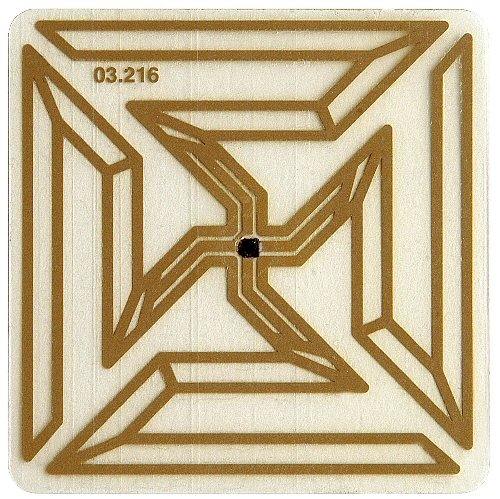
RFID microchip - The New SWASTIKA
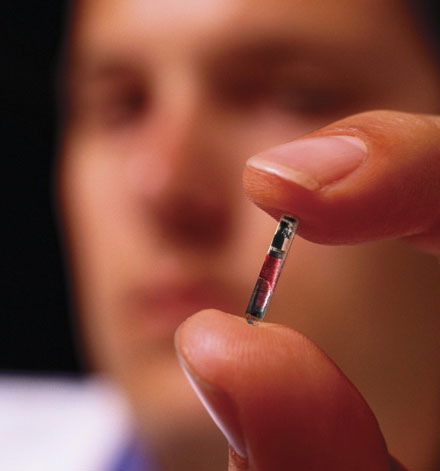
This little VeriChip will let the banking elites decide whether you are worth living or not... in their eyes you are nothing but wasteful middle class eaters and credit card swipers living in their world
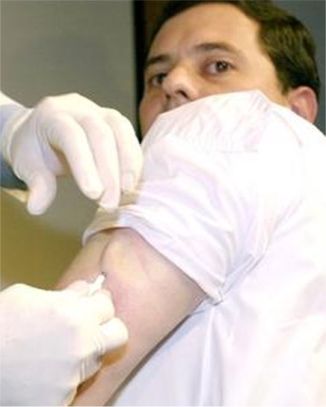
Injection is quick and easy, and implant will remain there for THE REST OF YOUR LIFE

Nothing protects your babies more than injecting them with chips AT BIRTH VeriChip's infant protection systems
*******************************************
ACLU Rips Plan to Track R.I. Students
*******************************************
Associated Press
Jan 7, 2008
PROVIDENCE, R.I. (AP) - A tech company with ties to a school district plans to test a tracking system by putting computer chips on grade-schoolers' backpacks, an experiment the ACLU ripped Monday as invasive and unnecessary.
PROVIDENCE, R.I. (AP) - A tech company with ties to a school district plans to test a tracking system by putting computer chips on grade-schoolers' backpacks, an experiment the ACLU ripped Monday as invasive and unnecessary.
The pilot program set to start next week in the Middletown school district would have about 80 children put tags containing radio frequency identification chips, or RFID chips, on their schoolbags. It would also equip two buses with global positioning systems, or GPS devices.
The school and parents will be able to track students on the bus, and the district hopes the program will improve busing efficiency, Superintendent Rosemarie Kraeger said. The devices are intended to record only when students enter and exit the bus, and the GPS would show where the bus was on it's route.
Parents could opt out of the program, Kraeger said.
The pilot program, made by MAP Information Technology Corp., is to run for several months at the Aquidneck School, she said. The district, which serves about 2,500 students, is the company's only client, said Deborah Rapp, the company's director of marketing and communications.
Steven Brown, executive director of the Rhode Island chapter of the American Civil Liberties Union, sent a letter to Kraeger and members of the school committee calling the plan "a solution in search of a problem" and saying the school district should already have procedures in place to track where its students are.
On Monday, he said the program raises enormous privacy and safety concerns.
"There's absolutely no need to be tagging children," he said. "We are not questioning the school district's ability to use GPS to monitor school buses. But it's a quantitative leap to monitor children themselves."
Rapp described the system as limited in scope.
"The program is solely designed to provide accountability when the children are in transit, from the moment they enter the bus to the moment they exit," she said. "It is limited to when they are on the bus. We in no way take it beyond that."
Brown also raised concerns that unauthorized people, perhaps using RFID readers that are easily bought online, could exploit information contained on the tags.
Ed Collins, the district's facilities manager, said that would not be possible. Collins and Rapp said the RFID tag would only contain an ID number, not a name, address or other personal information. Only the school administration would be able to match the ID number with the child, Rapp said.
Collins is the brother of Chris Collins, who founded MAP Information Technology last year. The district did not need clearance from the state ethics commission to set up the testing, however, because the program is free during the pilot, Kraeger said.
Officials with the district, which neighbors a naval station and the famed yachting community of Newport, said they didn't have an estimate on what it would cost to put the tracking system in place district-wide.
Kraeger said she was unaware of the controversy ignited three years ago when a Northern California school system planned to put in place an RFID system to track students at school. The proposal died after protests by parents and privacy and civil liberties advocates, including the ACLU.
The Middletown school board approved the pilot program in November. In a recent letter to parents, the company and the district explained the program and invited parents to get in touch with the school system if they had any questions, Rapp said. No one called.
The district was interested in trying out the program in the hopes that it would improve communication with parents, who will be able to check a Web site to see whether the buses are on time and their children are on them, Kraeger said.
Tracking students' movements will be no different from an existing system that allows parents to see what their child had for lunch or check their attendance record, Kraeger said.
"If a bus were delayed, they could look for their own student ID and see where the bus was," she said.
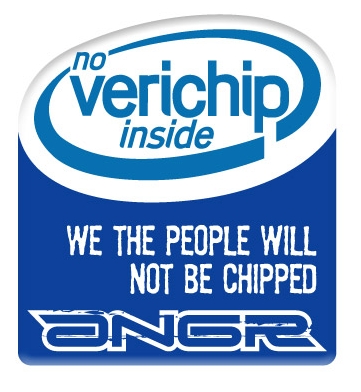
Some other ingenious ideas...
***************************************************
U.K. Kids Get RFID Chips In School Uniforms
***************************************************
Trevor Darnborough, whose company, Darnbro, filed for a patent on securing RFID tags to clothing, hopes other schools will be interested.
By Thomas Claburn
InformationWeek
October 25, 2007 03:00 PM
Ten schoolchildren in the United Kingdom are being tracked by RFID chips in their school uniforms as part of a pilot program.
If the program proves successful as a way to hasten registration, simplify data entry for the school's behavioral reporting system, and ensure attendance, Trevor Darnborough, whose company, Darnbro, filed for a patent on securing RFID tags to clothing, hopes other schools will be interested, according to the Doncaster Free Press.
The chipped children are enrolled at Hungerhill School in Edenthorpe, England, a secondary school for ages 11 to 16.
David Clouter, a parent and founder of Leave Them Kids Alone, a children's advocacy group, condemned the plan. "With pupils being fingerprinted and now this it seems we are treating children in a way that we have traditionally treated criminals," he told the Doncaster Free Press.
"The system is not intrusive to the pupil in the slightest," Hungerhill teacher Graham Wakeling told the Doncaster Free Press. He also said that all the patents of the children in the trial supported the tracking effort.
Video surveillance is already commonplace in the United Kingdom, and a growing number of schoolchildren are fingerprinted for administrative and security reasons. Since 2001, nearly 6,000 pupils have been fingerprinted in the United Kingdom, the Daily Mail reported earlier this month, with 20 new schools embracing the practice every week.
In a blog post about the report, security expert Bruce Schneier quipped, "So now it's easy to cut class; just ask someone to carry your shirt around the building while you're elsewhere."
WATCH ALL OF THESE VIDEOS! US DOLLAR IS COLLAPSING, USHERING IN A CASHLESS CHIPPED SOCIETY WHETHER YOU WANT TO BELIEVE IT OR NOT! THE BANKING CARTELS WANT TO CHIP ANYONE WHO WISHES TO OPEN A BANK ACCOUNT, TO CONSUME, OR TO BE BORN FOR THAT MATTER!
video
IBM, Verichip, and the Fouth Reich - RFID chips are the reincarnation of the Nazi tracking system in concentration camps!
video
Aaron Russo (excerpt from Zeitgeist) spoke about Rockefeller bankers' plan to chip and have total control over the entire population
video
video
National Geographic promotes RFID chips - pt. 1 (NaGeo is funded by the Rothschild banking empire)
video
National Geographic promotes RFID chips - pt. 2
Cashless society and RFID chips - The world is moving towards a cashless society system, that will track and control all. The technology exists today through biometrics, direct deposit, and the implantable microchip to put this plan into play in the near future.
video
RFID-laced National ID (North American Union ID) for your gas consumption
CITIBANK CHANGING BIOMETRICS
..
Añadir a mi perfil | Más Videos
CITIBANK's plans for biometrics
http://www.aclu.org/privacy/spying/surveillancesocietyclock2.html
----------------- Bulletin Message -----------------
From: Whatever Defines You, Insert Here______.
Date: Jan 9, 2008 8:10 AM
The article clearly skipped the most important key word RFID. This had been a huge controversy for a while, and now the NWO government has finally approved the new passport to track you down. Now it is just a matter of time before the RFID National ID, then soon you will all get that chip injected in your body. Good luck.
Two RFID researchers created a video showing how an RFID reader attached to an improvised explosive device could theoretically identify a U.S. citizen walking past the reader and set off a bomb. They haven't yet tested the theory on a real U.S. passport since the documents have yet to be distributed. The still here shows an attack using a prototype passport with RFID chip placed in the pocket of the victim. As the chip passes the reader, the reader detonates an explosive device placed in the trash can.
****************************************
Passport card technology approved
****************************************
Associated Press
Jan 06 2008
By EILEEN SULLIVAN
WASHINGTON - Passport cards for Americans who travel to Canada, Mexico, Bermuda and the Caribbean will be equipped with technology that allows information on the card to be read from a distance.
The technology was approved Monday by the State Department and privacy advocates were quick to criticize the department for not doing more to protect information on the card, which can be used by U.S. citizens instead of a passport when traveling to other countries in the western hemisphere.
The technology would allow the cards to be read from up to 20 feet away. This process only takes one or two seconds, said Ann Barrett, deputy assistant secretary for passport services at the State Department. The card would not have to be physically swiped through a reader, as is the current process with passports.
The technology is "inherently insecure and poses threats to personal privacy, including identity theft," Ari Schwartz, of the Center for Democracy and Technology, said in a statement. Schwartz said this specific technology, called "vicinity read," is better suited for tracking inventory, not people.
The State Department said privacy protections will be built into the card. The chip on the card will not contain biographical information, Barrett said.
And the card vendor — which has yet to be decided — will also provide sleeves for the cards that will prevent them from being read from afar, she said.
A 2004 law to strengthen border security called for a passport card that frequent border crossers could use that would be smaller and more convenient than the traditional passport. Currently, officials must swipe travelers' passports through an electronic reader at entry points.
The technology change for passport cards was initially proposed in October 2006, and public comments closed on Jan. 7, 2007. The State Department received more than 4,000 comments, and most were about the security of the technology.
On Jan. 31, land and sea travelers returning to the United States from Canada, Mexico, the Caribbean, and Bermuda will no longer be allowed to make an oral declaration of citizenship and must present a birth certificate and driver's license or passport.
To relieve a backlog at U.S. passport offices, the Bush administration recently delayed a requirement that Americans present passports when crossing the U.S. border by land or sea. The administration wanted to begin requiring passports or passport cards in mid-2008, but Congress mandates that the rule not go into effect until summer 2009.
********************************************
Hackers Clone E-Passports In Germany
********************************************
Wired.com
08.03.06
LAS VEGAS -- A German computer security consultant has shown that he can clone the electronic passports that the United States and other countries are beginning to distribute this year.
The controversial e-passports contain radio frequency ID, or RFID, chips that the U.S. State Department and others say will help thwart document forgery. But Lukas Grunwald, a security consultant with DN-Systems in Germany and an RFID expert, says the data in the chips is easy to copy.
"The whole passport design is totally brain damaged," Grunwald says. "From my point of view all of these RFID passports are a huge waste of money. They're not increasing security at all."
Grunwald plans to demonstrate the cloning technique Thursday at the Black Hat security conference in Las Vegas.
The United States has led the charge for global e-passports because authorities say the chip, which is digitally signed by the issuing country, will help them distinguish between official documents and forged ones. The United States plans to begin issuing e-passports to U.S. citizens beginning in October. Germany has already started issuing the documents.
Although countries have talked about encrypting data that's stored on passport chips, this would require that a complicated infrastructure be built first, so currently the data is not encrypted.
"And of course if you can read the data, you can clone the data and put it in a new tag," Grunwald says.
The cloning news is confirmation for many e-passport critics that RFID chips won't make the documents more secure.
"Either this guy is incredible or this technology is unbelievably stupid," says Gus Hosein, a visiting fellow in information systems at the London School of Economics and Political Science and senior fellow at Privacy International, a U.K.-based group that opposes the use of RFID chips in passports.
"I think it's a combination of the two," Hosein says. "Is this what the best and the brightest of the world could come up with? Or is this what happens when you do policy laundering and you get a bunch of bureaucrats making decisions about technologies they don't understand?"
Grunwald says it took him only two weeks to figure out how to clone the passport chip. Most of that time he spent reading the standards for e-passports that are posted on a website for the International Civil Aviation Organization, a United Nations body that developed the standard. He tested the attack on a new European Union German passport, but the method would work on any country's e-passport, since all of them will be adhering to the same ICAO standard.
In a demonstration for Wired News, Grunwald placed his passport on top of an official passport-inspection RFID reader used for border control. He obtained the reader by ordering it from the maker -- Walluf, Germany-based ACG Identification Technologies -- but says someone could easily make their own for about $200 just by adding an antenna to a standard RFID reader.
He then launched a program that border patrol stations use to read the passports -- called Golden Reader Tool and made by secunet Security Networks -- and within four seconds, the data from the passport chip appeared on screen in the Golden Reader template.
Grunwald then prepared a sample blank passport page embedded with an RFID tag by placing it on the reader -- which can also act as a writer -- and burning in the ICAO layout, so that the basic structure of the chip matched that of an official passport.
As the final step, he used a program that he and a partner designed two years ago, called RFDump, to program the new chip with the copied information.
The result was a blank document that looks, to electronic passport readers, like the original passport.
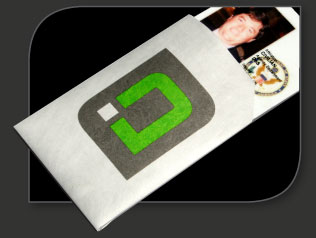
By the way, you can also purchase this beautiful sleeve designed to protect a single identification, passport, credit or debit card. Secure Sleeve,, products from Identity Stronghold ensure that invasive communications such as relaying, eavesdropping, cloning and tracking of ID, debit and credit cards, and U.S. passports do not occur.
PLUS YOU WOULD NOT FRY YOUR FAMILY JEWELS IN CASE OF AN ELECTRO-MAGNETIC ACCIDENT... FEEL SAFE NOW?
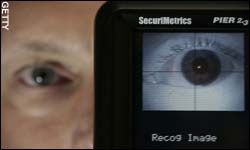
******************************************************************
FBI to scan Brits’ eyes, earlobes and monitor how they walk
******************************************************************
Telegraph UK
December 22, 2007
By Tim Shipman in Washington
New technology may allow long-range iris scans. Fingerprints, iris scans and even details of the way people walk, their scars and the size and shape of their ear lobes will be collected.
British visitors to the US will have details of their physical characteristics added to a new billion dollar database under plans drawn up by the FBI.
Fingerprints, iris scans and even details of the way people walk, their scars and the size and shape of their ear lobes will be collected.
British intelligence agencies and police will also be able to access the information – giving them potentially more biometric data on British citizens than the Government collects at home.
Under the plans, revealed by the Washington Post, the FBI database will include details on everyone who applies for a visa to enter the US.
Fingerprint information on British tourists is already collected and held by the US Department of Homeland Security.
But the FBI database will also include iris identification, which is being slowly introduced at some ports of entry.
Researchers at West Virginia University are working on technology for the FBI that will let them capture images of people’s irises at distances of up to 15 feet, and of faces from as far away as 200 yards, without them even knowing.
The database will allow the FBI to check all entrants to the US against the faces, fingerprints, palm prints and irises of known terrorists and wanted criminals.
More than 900,000 American police and law enforcement officials will be able to access the data.
A contract to develop the database will be awarded next month. Critics say that peoples’ bodies will effectively become their international identity card – with the downside that if criminals steal your identity and were able to, for example, mimic your iris with a contact lens, you can’t just go and get a new eyeball like you would a new credit card.
Civil liberties campaigners criticised the plans. Barry Steinhardt of the American Civil Liberties Union said: “It’s enabling the always-on surveillance society.”
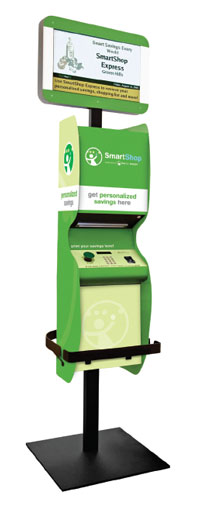

******************************************
Shell station customers ‘pay by touch’
******************************************
Associate Press
November 1, 2007
Shell Oil provided this photo of a Pay By Touch enrollment kiosk. Chicago drivers have a new way to pay for gasoline: with their fingertips.Ten Shell gas stations in the Windy City are testing biometric systems that let consumers walk up to the pump, scan their fingertips on a device and fill up their vehicles. The systems, also installed at Shell convenience stores, are directly linked to customers’ checking or credit-card accounts for payment.
AP | Nov 1, 2007
By LAUREN TARA LaCAPRA
NEW YORK - Chicago drivers have a new way to pay for gasoline: with their fingertips.
Ten Shell gas stations in the Windy City are testing biometric systems that let consumers walk up to the pump, scan their fingertips on a device and fill up their vehicles. The systems, also installed at Shell convenience stores, are directly linked to customers’ checking or credit-card accounts for payment.
“When we talk to customers, they’re always looking for ways to make buying gasoline quicker and easier, and always looking for ways to make their transactions faster and more secure,” said Chris Susse, Shell’s manager of global refueling innovations. “They don’t want to carry more cards, kits and keychains, and they want it to be free.”
Customers will be able to initially scan their fingerprints at a kiosk inside the gas station and can link payment information either at the store or online.
The biometric devices, made by a San Francisco-based company called Pay By Touch, are one part of a technological trifecta Shell is rolling out at its gas stations.
Shell has partnered with Fuelcast Media International LLC to offer local news, weather and sports on digital screens at the pump. Fuelcast pays Shell for the ability to display advertisements along with the content from local NBC stations. The monitors are installed at 300 Shell stations across the U.S.
In addition, gas station attendants are testing hand-held wireless devices that allow full-service customers to pay electronically at their car window.
The high-tech push is a multi-prong initiative to build customer loyalty, stay ahead of competitors on the technological curve and gain revenue from the Fuelcast deal. Shell said it is the first brand to launch the biometric systems, though expansion hinges on whether its customers take to the futuristic finger scanners.
Brandon Wright, spokesman for the Petroleum Marketers Association of America, said he had not heard of any gas stations using biometrics, but wouldn’t be surprised if they were featured on the “next generation of pumps” as consumers demand quick, convenient payment methods.
Shell, which is part of Royal Dutch Shell PLC, has not yet promoted the systems, so uptake has been minimal, Susse said.
Sunflower Market, a Chicago grocery store, also has Pay By Touch systems installed. About 2 percent of its customers signed up for the payment option, said the store’s manager, Debbie Britton.
“I think it scares people,” Britton said. “They’re more confused about the whole system. Some of them say, ‘Well, now the FBI can find me.’”
Shoppers who consider signing up for such systems should find out whether their information is shared with affiliates or third parties, said Beth Givens, director of the Privacy Rights Clearinghouse.
Shell said it will not share personal information of Pay By Touch customers with third parties, and it still offers traditional forms of payment for those uncomfortable with the system.
Shell officials note that the system is less susceptible to identity theft since it’s impossible to duplicate or steal a fingerprint. Alternatives like cash, credit cards and keychain payment cards with radio-frequency identification chips can be stolen and used by others.
Industrywide adoption depends on whether gas station owners will be willing to pay for new pumps, which can cost “thousands to tens of thousands of dollars,” the PMAA’s Wright said.
Shell is uncertain of how much the high-tech initiative will ultimately cost or how the devices will be received, although the pilot program is not a major expense, Susse said.
Nonetheless, the Houston-based company is betting that making its brand distinct from other gas stations will make customers come back.
“We’d like to see an increase in customer loyalty because we’re the only gas retailer offering this service,” Susse said.
**********************************************
RFID Revolution: Your cars will be tagged
**********************************************
Economic Times
25 Sep, 2007
NEW DELHI: The ministry of heavy industries is considering a proposal to make it mandatory to fit RFIDenabled devices in the cars manufactured in India. It will be the responsibility of the car manufacturers to ensure that all new cars have these radio-frequency identification tags. It is believed that RFID tags would help in traffic management as traffic violations by motorists could be tracked and all violations identified. Also, motorists would get charged automatically as soon as they enter a toll area.
The RFID-based system that is proposed to enable tracking of vehicles relies on storing and remotely retrieving data using devices called RFID tags or transporters . An RFID tag is an object that can be fitted on any object for the purpose of identification using radiowaves.
“The expected increase of cars and SUVs from 2005 to 2035 is 13 times (35.8 million to 236.4 million vehicles), while two wheelers are expected to increase about 6.6 times (35.8 million to 236.4 million vehicles). This coupled with declining share of public transport is leading to severe problem of congestion , inflicting a high cost on the economy in the form of travel delays, loss of productivity and increase in road fatalities and air quality deterioration. Therefore, enabling every car with RFID would help the government track them remotely,” an official said.
In Singapore, public transport buses and trains employ passive RFID cards known as EZ-Link cards. Traffic into crowded downtown areas is regulated by variable tolls imposed using an active tagging system combined with the use of stored-value cards (known as cash cards). RFID is also used in Malaysia Expressways payment system, known as ‘Touch ‘n Go’ . Due to the name and design, the card needs to be touched for usage.
The ministry of urban development has already discussed a similar agenda with many states. The ministry has proposed a ‘core area charge’ for different cities to reduce traffic congestion in the city’s nerve centre. So, people could end up paying a special levy to drive into Connaught Circus, the heart of the Capital.
According to government officials, the important areas in major metropolitan cities like Connaught Place in Delhi, MG Road in Bangalore and Colaba and Andheri in Mumbai have been facing chaotic traffic and attendant environment problems. The Delhi government is planning to substantially increase the parking fee and entrance charge in such core areas to convert them into traffic-free zones.
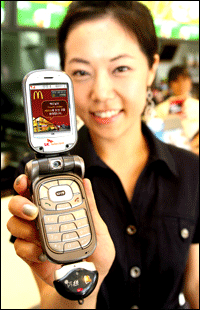
***********************************************************************************
McDonald’s previews new system using cell phones to place orders and pay
***********************************************************************************
RFID News | Sep 17, 2007
McDonald’s RFID Reader on PnoneMcDonald’s has teamed up with SK Telecom to offer a new way of ordering. The new ordering scheme, which uses RFID was unveiled at a McDonald’s in western Seoul. According to an article in The Korea Times, customers have to first download a program to their handsets using SK Telecom’s Nate mobile Internet service in order to use the system. Once inside McDonald’s, each table has an RFID enabled menu as well as an RFID reader that plugs into the handsets. Customers plug the reader into their mobile phones, and point them at the item on the menu that they wish to eat or drink. The bill is then charged through the mobile phone and when the meal is ready, the system sends a text message to the phone so the customer can pick up the ready tray at a designated counter.
National ID really is a license for the North American Union ( for all US Canada Mexico citizens )... and it is laced with the RFID tracking chip. One step further into a cashless chipped surveillance society.
video
The threat of the National ID (Real ID)
video
Once the RFID chip-laced National ID is issued to everyone in the US, VeriChip corporation will inject the RFID technology into your deep skin tissues. Sounds fun eh?
video
Ron Paul explains the National ID = Real ID card
video
Newly issued US passports with RFID chips
The Department of Homeland Security is set to announce guidelines on its REAL ID initiative. (ABC News Photo Illustration)
video
*******************************************************
DHS Announces New License Security Standards
*******************************************************
REAL ID Program Has Drawn Criticism From States, Privacy Groups
ABC News
Jan. 11, 2008
By JASON RYAN, PIERRE THOMAS and THERESA COOK
If you were born after Dec. 1, 1964, be prepared to face something in addition to that long line at the Department of Motor Vehicles in the next few years: more scrutiny.
Because of 9/11 commission recommendations aimed at rooting out potential terrorists, driver's license rules and procedures will be stricter and standardized across all 50 states, Homeland Security Secretary Michael Chertoff announced today.
"There are three categories of people who will be very unhappy about secured driver's licenses," Chertoff said, "terrorists and people who want to get on airplanes and in federal buildings and avoid terrorist watch lists, illegal immigrants who want to work in this country by pretending to be American citizens and con men."
But the new plan is likely to anger many more — from states who will have to implement the costly changes to civil rights groups who say the changes will invade individuals' privacy and make them more vulnerable to identity theft.
The program, called REAL ID, will require states to ask license applicants for proof of citizenship and residency, instead of the typical date of birth and Social Security number. States will also have to work together to make certain the applicants don't obtain multiple licenses, and they'll need to add security features into the license design in order to help stop counterfeiting.
Most individuals will be required to present REAL ID-verified identification for boarding commercial airline flights, accessing a federal facilities and entering nuclear power plants before the end of 2014.
The department is asking that the states take steps toward complying with the program by May 2008, with the first deadline set for Dec. 31, 2009. By that date, states must have upgraded license security and a system in place to verify the citizenship and residency status of all license applicants.
Those who have not reached the age of 50 — individuals born after Dec. 1, 1964 — will need a REAL ID-compliant license by Dec. 1, 2014, but the program extends the deadline exactly three years for those above that age threshold.
 tovarna rog
tovarna rog
Novi komentarji
9 ur 5 min od tega
1 dan 12 ur od tega
6 dni 13 ur od tega
Prvi dan v tednu 3 ure od tega
Prvi dan v tednu 22 ur od tega
Prvi dan v tednu 22 ur od tega
Prvi dan v tednu 5 dni od tega
Prvi dan v tednu 5 dni od tega
Prvi dan v tednu 5 dni od tega
Prvi dan v tednu 6 dni od tega